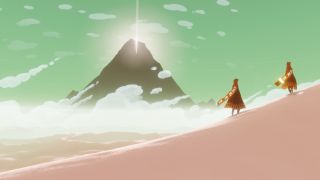Why Journey is one of the greatest games ever made
Redefining movement

Here's what you need to know about Thatgamecompany's Journey: It's short. It's got kind of an exploration-heavy puzzle-platformer vibe, with splashes of adventure game. What else? It's pretty, it sounds good. Oh, and it understands human emotion on such a basic, fundamental level that it knows how players will react to any given situation, and respond accordingly. Every developer, irrespective of their discipline, can learn from it, and every person is better off for having played. It signifies a watershed moment for the game industry; it is our Citizen Kane. All of this is to say, Journey's easily one of the greatest games ever made.
Editor's note: Journey is best experienced with little to no prior knowledge of it. If you haven't yet played this game, may we suggest bidding adieu to GamesRadar, booting up your PS3, and we'll see you again in a couple of hours? Great.
One of Journey's greatest achievements is the way in which it redefines movement, that basic and original tenet of games. In many ways, Journey is a game about movement--a palpable traversal of environments to elicit emotion--and this is evident from the get-go. Journey's opening sequence drops the player at the foot of a sand dune. A hill must be climbed, and as you ascend, a toil sets in for each step taken.
When you reach the summit, two things happen. First, you see an intimidating expanse situated between you and a majestic mountain, the climbing of which puts your current accomplishment to shame. The second thing you notice is that your movement is unencumbered, a feeling made all the more delightful as you speedily zip down the other side of the hill. So just to review, there's feelings of hardship, accomplishment, satisfaction, awe, foreboding, delight, and curiosity, all from just walking up one side of a hill and sliding down the other.

Journey's also an aesthetic masterpiece, from a purely technical perspective. However, calling out the quality of its textures or music is to miss the genius--the way sight and sound couple with movement to further heighten and convey emotion.
There is the above example, yes, but take for instance a sequence early in the game, where you find yourself sliding down a hill at an increasingly alarming rate, unable to slow or stop. Around you fly ethereal beings, eagerly urging you along in your descent. You hit a tunnel, and the camera flips to a side-scrolling angle. The color palette transitions to darker, lusty reds, and your mountain goal appears, closer, illuminated like a beacon by the sun. You feel swept away, excited, joyous, and also a bit fearful over the loss of control. You think of the first time you fell in love.
Sign up to the GamesRadar+ Newsletter
Weekly digests, tales from the communities you love, and more
Most Popular



